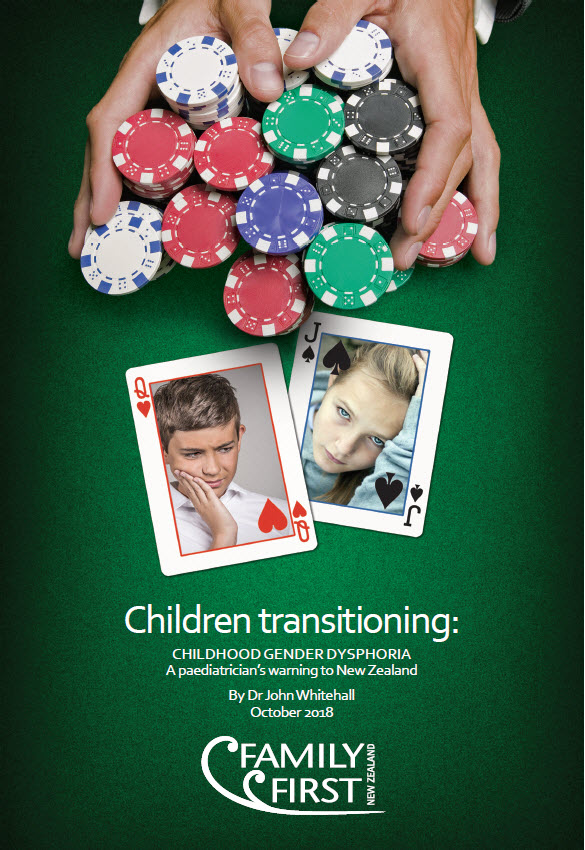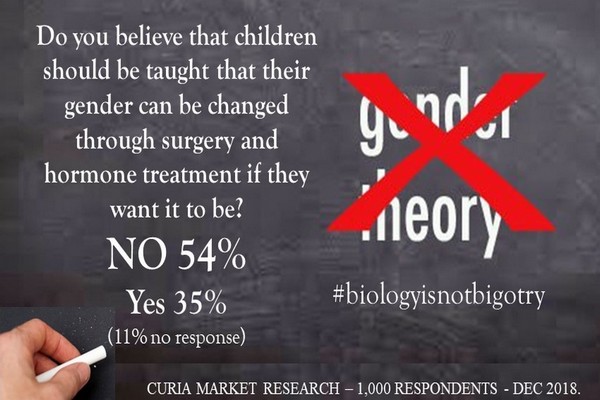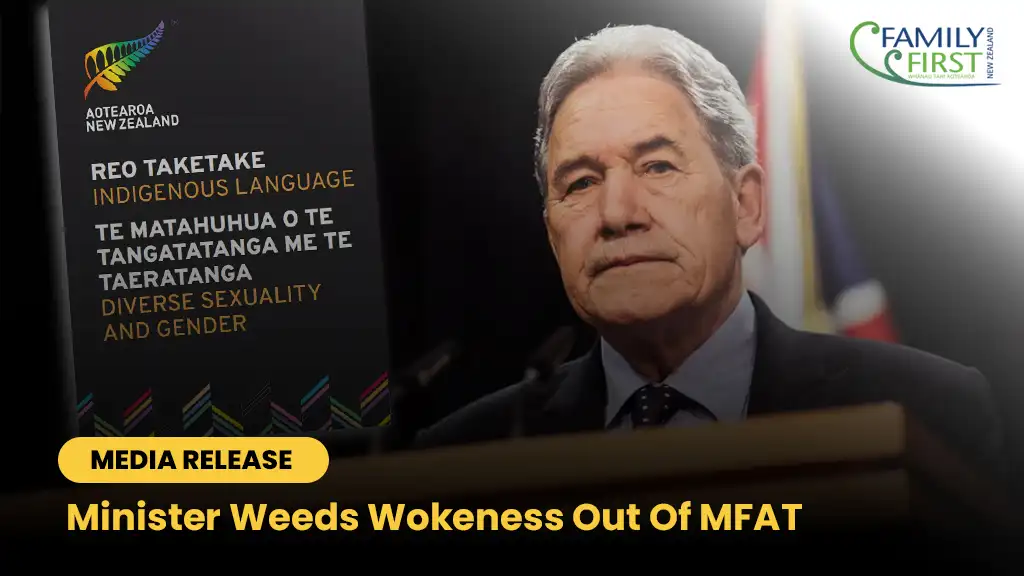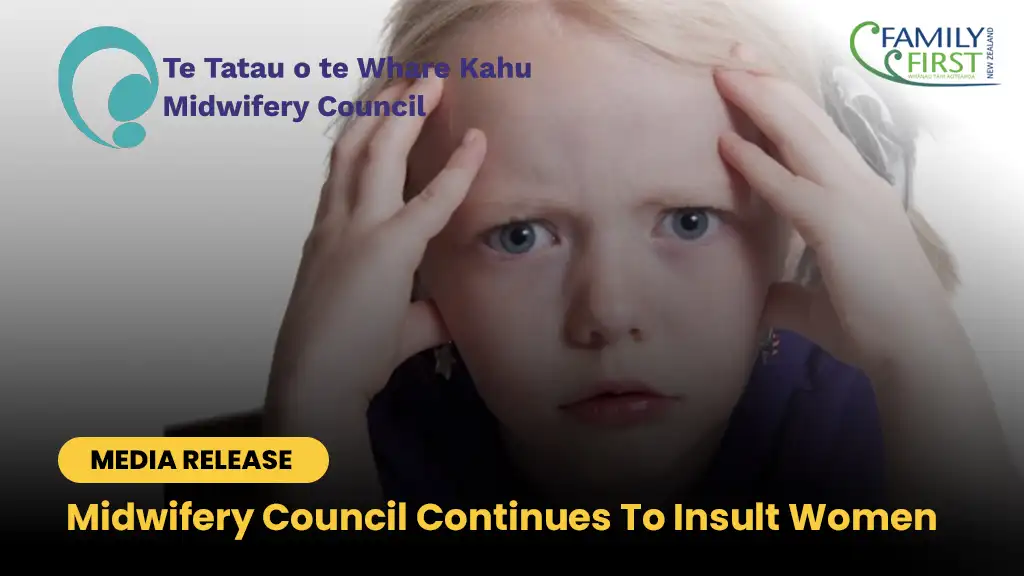Media Release 14 January 2019
Polling by Curia Market Research has found stronger support for children not to be taught that their gender can be changed and for toilets and changing rooms to be based on biological sex.
In the poll of 1,000 New Zealanders surveyed last month, respondents were asked “Do you believe that children should be taught that their gender can be changed through surgery and hormone treatment if they want it to be?” 54% said children should not be taught this, 35% said they should, and a further 11% were unsure or refused to say.
When asked whether schools allow children to choose the toilet, changing room and camp bunkroom they use based on their gender identity or their biological sex, 46% said it should be based on biological sex and 36% said gender identity. 18% were unsure or refused to say.
Opinions were evenly matched when asked whether children play in sports teams based on their gender identity or their actual biological sex (39% for each option – 22% unsure). Males, people living in provincial and rural areas, and those aged 18-40 were more likely to want sport based on biological sex.
For all three questions, the highest support for biological sex over gender identity were NZ First and National party voters, and lowest was Green party supporters.
 A recent report by an Australian paediatrician sent a strong warning to New Zealand that allowing children to choose their gender has no scientific evidence in medical literature to support the massive interventions of the medical pathway, and that the most vulnerable of children will be at particular risk. The report “Children Transitioning: Childhood gender dysphoria – A paediatrician’s warning to New Zealand”, written by Professor John Whitehall who is Foundation Chair and Professor of Paediatrics and Child Health at the University of Western Sydney, said that such a massive intervention into the minds and bodies of children could be expected to be based on a concrete body of scientific experimentation but, astonishingly, that is not the case. There is no biological basis to the confusion over gender: it has the hallmarks of a psychological fad, fanned by an uncritical, sensationalist media, given direction by private websites and even government funded programmes of ‘education’.
A recent report by an Australian paediatrician sent a strong warning to New Zealand that allowing children to choose their gender has no scientific evidence in medical literature to support the massive interventions of the medical pathway, and that the most vulnerable of children will be at particular risk. The report “Children Transitioning: Childhood gender dysphoria – A paediatrician’s warning to New Zealand”, written by Professor John Whitehall who is Foundation Chair and Professor of Paediatrics and Child Health at the University of Western Sydney, said that such a massive intervention into the minds and bodies of children could be expected to be based on a concrete body of scientific experimentation but, astonishingly, that is not the case. There is no biological basis to the confusion over gender: it has the hallmarks of a psychological fad, fanned by an uncritical, sensationalist media, given direction by private websites and even government funded programmes of ‘education’.
“Sadly, the most vulnerable of children appear to be at particular risk: numerous reviews reveal the majority of children confused about their gender also suffer from diagnosed mental disorders, such as depression and anxiety. Proponents of the medical pathway declare it is necessary to prevent suicide but, again, there is no evidence that gender dysphoria in children, per se, is associated with a higher risk of suicide. The accompanying mental and family disorders, however, are known to be associated with self-harm and, therefore, an affected child and family deserves close attention and compassion. Suicide may be prevented by compassionate ‘watchful waiting’ for the natural effects of puberty to orientate the child in the direction of its chromosomes, while applying standard therapy to the associated mental disorder. Society and governments are being led by so-called ‘expert opinion’. The medical pathway is based only on ideology, and claims of ‘success’ reflect beliefs, not science. Even worse, these beliefs are not negotiable: they have become coercive,” says Dr Whitehall.
 Bob McCoskrie, National Director of Family First NZ, who commissioned the polling says:
Bob McCoskrie, National Director of Family First NZ, who commissioned the polling says:
“Policymakers should be concerned with how misguided school policies (including the school sex education curriculum and programmes such as InsideOut and Mates and Dates) might encourage students to identify as girls when they are boys, and vice versa, and might result in prolonged difficulties. Schools are being pressured in to accepting gender ideology by groups such as the Human Rights Commission, Rainbow Youth and the Ministry of Education who try and tell schools and families that the so-called right of an individual to use the toilet and changing room and bunkroom that conforms to his or her ‘gender identity’ takes precedence over modesty and safety. These indoctrination programmes are simply confusing and stressing our children, and it’s starting to show.”
“It’s time that the Education and Health Ministries placed priority on scientific evidence and sound medical practice, rather than bowing to ideology and special interest groups pushing a radical agenda. Biology is not bigotry,” says Mr McCoskrie.
Family First NZ has provided schools with a legal opinion that says they are not required under the law to have to allow transgender students access to shared toilets, showers and changing rooms, or allow transgender students to participate in sports teams that do not match their biological sex. As well as the legal opinion, Family First has also sent schools a suggested “Student Physical Privacy Policy” relating to toilets, changing rooms, and sports teams which schools can consider adopting when considering this issue in their own schools. The suggested policy says that schools must be both respectful of the privacy concerns of all children and sensitive to the diverse needs of individual children, but that no child should be forced into an intimate setting – like a toilet block or a changing room – with another child of the opposite sex. The policy suggests that in special circumstances, the Principal may offer options for alternate facilities, which may be access to a single-stall toilet; access to a unisex toilet; or controlled use of a staff toilet, changing room, or shower.
In 2017, Family First NZ launched a campaign called AskMeFirst in response to the growing trend in both NZ schools and public places to allow men to enter women’s spaces — female toilets, showers, changing rooms, camp bunk rooms, and sports teams. The website www.askmefirst.nz highlights a number of situations in NZ schools that have already happened, and also some overseas examples.
The nationwide poll was carried out during December and has a margin of error of +/- 3.1%.
ENDS




